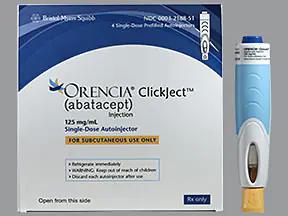Abatacept Disease Interactions
There are 5 disease interactions with abatacept.
Abatacept (applies to abatacept) COPD
Moderate Potential Hazard, Moderate plausibility. Applicable conditions: Chronic Obstructive Pulmonary Disease
In studies, patients with chronic obstructive pulmonary disease (COPD) treated with abatacept for rheumatoid arthritis developed adverse events (including COPD exacerbations, cough, rhonchi, dyspnea) more frequently than those treated with placebo. Abatacept should be used with caution in patients with COPD and such patients should be monitored for worsening of their respiratory status.
Abatacept (applies to abatacept) diabetes
Moderate Potential Hazard, Moderate plausibility. Applicable conditions: Diabetes Mellitus
Parenteral drug products containing maltose can interfere with readings from blood glucose monitors that use test strips with glucose dehydrogenase pyrroloquinoline quinone (GDH-PQQ). The GDH-PQQ-based glucose monitoring systems may react with the maltose in abatacept for IV administration, resulting in falsely elevated blood glucose readings on the day of abatacept infusion. When receiving IV abatacept, patients that require blood glucose monitoring should be advised to consider methods that do not react with maltose, such as those based on glucose dehydrogenase nicotine adenine dinucleotide (GDH-NAD), glucose oxidase, or glucose hexokinase test methods.
Because abatacept for subcutaneous administration does not contain maltose, patients do not need to alter their glucose monitoring.
Abatacept (applies to abatacept) hepatitis B
Moderate Potential Hazard, Moderate plausibility. Applicable conditions: Infectious Hepatitis
Because antirheumatic therapies have been associated with hepatitis B reactivation, patients should be screened for viral hepatitis in accordance with published guidelines before starting therapy with abatacept. Patients screening positive for hepatitis were excluded from clinical studies with abatacept.
Abatacept (applies to abatacept) infections
Moderate Potential Hazard, Moderate plausibility. Applicable conditions: Infection - Bacterial/Fungal/Protozoal/Viral
Serious infections (including sepsis, pneumonia) have been reported in patients receiving abatacept. Caution and close monitoring are recommended when considering the use of abatacept in patients with history of recurrent infections, underlying conditions which may predispose them to infections, or chronic, latent, or localized infections. Administration of abatacept should be discontinued if a patient develops a serious infection.
Posttransplant lymphoproliferative disorder (PTLD) and cytomegalovirus (CMV) invasive disease occurred in patients who received abatacept for acute graft versus host disease (aGVHD) prophylaxis during unrelated hematopoietic stem cell transplantation (HSCT); the PTLD events were associated with Epstein-Barr virus (EBV) infection. Patients should be monitored for EBV reactivation according to institutional practices; prophylaxis for EBV infection should be provided for 6 months posttransplantation to prevent EBV-associated PTLD. Patients should be monitored for CMV infection/reactivation for 6 months posttransplant regardless of pretransplant CMV serology results for donor and recipient; prophylaxis for CMV infection/reactivation should be considered.
Abatacept (applies to abatacept) tuberculosis
Moderate Potential Hazard, Moderate plausibility. Applicable conditions: Tuberculosis -- Latent, Tuberculosis -- Active
Prior to initiating abatacept, patients should be screened for latent tuberculosis (TB) infection according to current TB guidelines. Patients testing positive in TB screening should be treated by standard medical practice prior to therapy with abatacept. Caution should be taken when prescribing abatacept to these patients as this agent has not been studied in patients with a positive TB screen, and the safety of abatacept in patients with latent TB infection is unknown.
Switch to professional interaction data
Abatacept drug interactions
There are 174 drug interactions with abatacept.
More about abatacept
- abatacept consumer information
- Check interactions
- Compare alternatives
- Reviews (75)
- Side effects
- Dosage information
- During pregnancy
- Drug class: antirheumatics
- Breastfeeding
- En español
Related treatment guides
Drug Interaction Classification
| Highly clinically significant. Avoid combinations; the risk of the interaction outweighs the benefit. | |
| Moderately clinically significant. Usually avoid combinations; use it only under special circumstances. | |
| Minimally clinically significant. Minimize risk; assess risk and consider an alternative drug, take steps to circumvent the interaction risk and/or institute a monitoring plan. | |
| No interaction information available. |
See also:
Further information
Always consult your healthcare provider to ensure the information displayed on this page applies to your personal circumstances.


